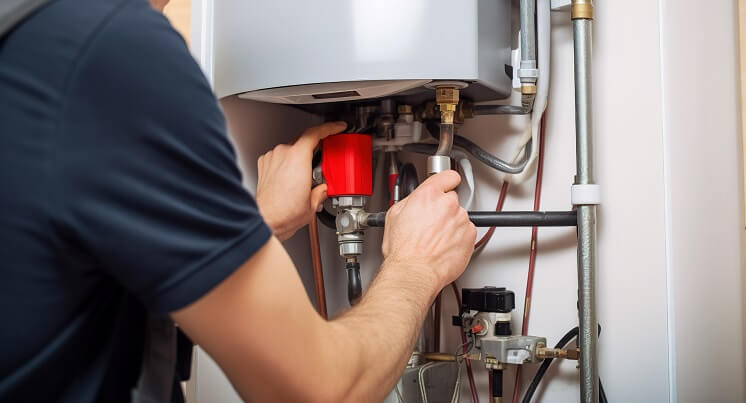General Water Heater Complications Explained
General Water Heater Complications Explained
Blog Article
Are you trying to find tips about Common Problems with Tank Water Heaters?

Visualize starting your day without your routine hot shower. That already establishes a bad tone for the remainder of your day.
Every residence requires a dependable hot water heater, however only a few recognize exactly how to take care of one. One very easy way to keep your water heater in top shape is to look for mistakes routinely as well as fix them as quickly as they show up.
Keep in mind to shut off your hot water heater prior to sniffing around for faults. These are the water heater faults you are most likely to experience.
Water as well hot or also cold
Every water heater has a thermostat that identifies just how hot the water obtains. If the water coming into your residence is too warm regardless of setting a practical optimum temperature level, your thermostat could be faulty.
On the other hand, too cold water may be because of a stopped working thermostat, a busted circuit, or inappropriate gas flow. For instance, if you use a gas hot water heater with a broken pilot burner, you would get cold water, even if the thermostat remains in ideal problem. For electric heating systems, a blown fuse may be the offender.
Insufficient warm water
Hot water heater can be found in lots of dimensions, relying on your hot water demands. If you lack hot water before everybody has had a bathroom, your hot water heater is as well tiny for your family size. You need to consider mounting a bigger hot water heater tank or opting for a tankless hot water heater, which takes up much less area and is more long lasting.
Strange sounds
There are at least five sort of sounds you can learn through a water heater, but one of the most typical analysis is that it's time for the hot water heater to retire.
Firstly, you should be familiar with the regular seems a hot water heater makes. An electric heater might appear various from a gas-powered one.
Popping or banging sounds typically imply there is a piece of debris in your tanks, and it's time to cleanse it out. On the other hand, whistling or hissing noises may just be your shutoffs letting some stress off.
Water leaks
Leakages could come from pipes, water connections, shutoffs, or in the worst-case situation, the storage tank itself. With time, water will certainly rust the container, and also locate its way out. If this occurs, you require to change your water heater asap.
Nevertheless, before your modification your entire container, make sure that all pipes are in area and that each valve works completely. If you still need help determining a leakage, call your plumber.
Rust-colored water
Rust-colored water suggests among your hot water heater parts is rusted. It could be the anode rod, or the storage tank itself. Your plumber will certainly have the ability to determine which it is.
Lukewarm water
Despite just how high you established the thermostat, you won't get any warm water out of a heating unit well past its prime. A hot water heater's performance may decrease with time.
You will also get lukewarm water if your pipelines have a cross connection. This means that when you turn on a faucet, hot water from the heating system moves in alongside routine, cold water. A cross connection is easy to place. If your hot water taps still follow shutting the hot water heater shutoffs, you have a cross link.
Discoloured Water
Rust is a major reason for unclean or discoloured water. Deterioration within the water tank or a failing anode pole could cause this discolouration. The anode rod shields the container from rusting on the within and need to be inspected annual. Without a pole or an effectively functioning anode rod, the hot water promptly corrodes inside the container. Call an expert hot water heater professional to identify if changing the anode pole will deal with the trouble; otherwise, change your water heater.
Final thought
Preferably, your water heater can last 10 years before you require a change. Nevertheless, after the 10-year mark, you might experience any one of these faults more frequently. At this moment, you must include a brand-new hot water heater to your budget.
How To Troubleshoot 3 Common Water Heater Problems in Twin Cities
The Water Heater Is Leaking
A leaky cold water inlet valve A loose pipe fitting A leaky temperature and pressure relief valve A corroded anode rod A cracked tank Turn Off Your Water Heater:
Shut off your gas water heater by turning the gas valve on the unit to the “OFF” position. Shut off your electric water by switching its power off at your electrical panel. Look for a two-pole breaker labeled “water heater” and turn it to the “OFF” position. Move the ball valve connected to the water heater to be perpendicular to the piping at a 90° angle. Look for the Leak:
Depending on whether the water is coming from the tank's top or bottom, you’ll want to look for the leak in different locations.
If the leak comes from the top of the tank, carefully look for water escaping from the cold water inlet valve or loose pipe fittings. Rusted hot and cold water valves can have loose connections with the tank, with water leaking out of them.
https://mspplumbingheatingair.com/blog/how-to-troubleshoot-3-common-water-heater-problems
We had been brought to that article about Common Problems with Your Home Water Heater from someone on our other domain. Do you know about somebody else who is sincerely interested in the subject? Please feel free to share it. We truly appreciate reading our article about Water Heaters Problems.
Navigate plumbing issues professionally. Report this page